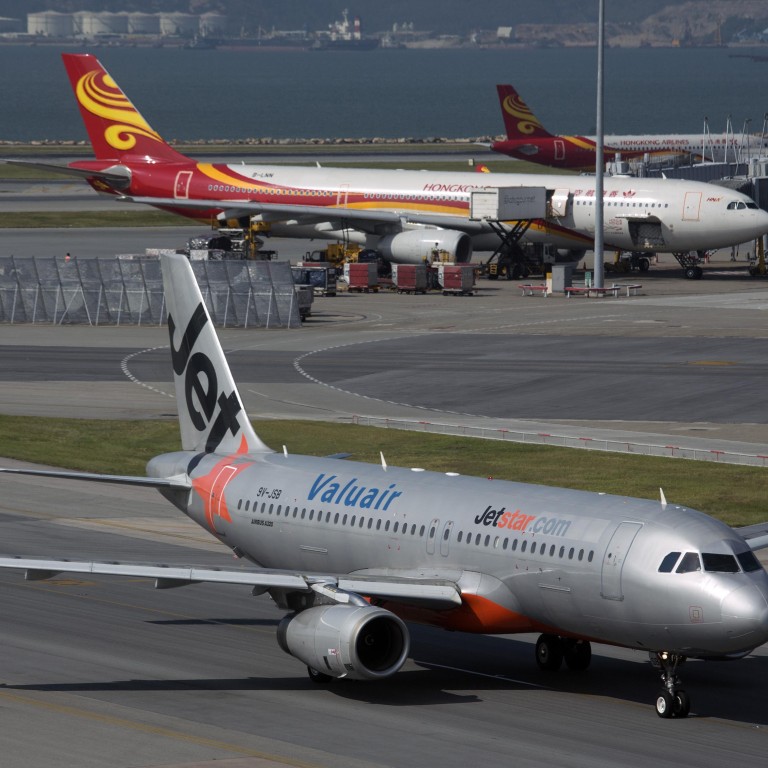
Green light for foreign budget airlines will harm Hong Kong's interests
Albert Cheng says a green light for Jetstar and others will create unfair competition for our home carriers and infringe the city's air sovereignty
Hong Kong Express Airways, a sister company of Hong Kong Airlines, has announced its first batch of budget flights to seven popular destinations, including cities in Japan, Thailand and Taiwan. Some of its prices were two-thirds cheaper than the usual, lower even than those of other budget airlines in the region.
Hong Kong is undoubtedly the most important aviation hub in the Asia-Pacific region. Tourism, as one of Hong Kong's four major pillar industries, brings in tens of billions of dollars of revenue annually. Aviation, both in passenger demand and on the cargo side, is a highly competitive market. Budget airlines are certainly the way forward for the aviation sector the world over.
According to the International Air Transport Association, this year's net profits for airlines are projected to increase to around US$11.7 billion.
Simply put, this aviation version of the individual visit scheme will taint our aviation industry
Budget airlines have really taken off around the world in the past few years. In Hong Kong, the sector is getting ready for take-off, which is why it has attracted quite a lot of potential investors. Singapore Airlines' low-cost carrier, Scoot, is ready to follow in the footsteps of HK Express and launch budget flights between Hong Kong and Singapore in November.
Consumers, of course, will always welcome low-cost airfares; the cheaper the prices, the better it is for travellers. But there are pros and cons.
Budget airfares do not cover essential charges such as fuel surcharges and baggage charges. Even though some offer free baggage handling, there is a very limited quota. Flight times are often very unfriendly to users, with many in the middle of the night or during non-peak hours. Because the tickets are cheap, there are many restrictions.
I am not against low-cost airlines per se, but to give foreign budget airlines such a free hand to expand their services is somehow putting Hong Kong-based airlines at a disadvantage, creating unfair competition and hurting their business operation.
It will also indirectly affect the livelihoods of hundreds of thousands of workers here, not forgetting other negative by-products, such as environmental pollution and noise pollution.
Furthermore, the existing two runways in Hong Kong are becoming saturated in terms of aircraft handling capacity, with a total of 64 aircraft movements per hour. The capacity is expected to rise to 68 aircraft movements by 2015.
And there will be no improvement until then because the Civil Aviation Department is too conservative to make innovative adjustments.
Already overstretched, the airport now has to handle additional budget flights late at night, which has caused unnecessary noise and environmental pollution. All these may not be offset by the economic benefits of budget airfares.
The introduction of budget airlines is like the expansion of the individual visit scheme for mainland travellers to Hong Kong, which has caused more harm than good because of the differentials in quality of these travellers. Simply put, this aviation version of the individual visit scheme will taint our aviation industry.
Fundamentally, I'm opposed to the pretentious posturing by some of the budget airlines that claim to be locally based.
Jetstar Hong Kong is now applying for a licence to operate in Hong Kong, a move that has been vehemently opposed by Cathay Pacific Airways and other Hong Kong-based airlines. As pointed out by Cathay, Jetstar's licence application goes against Article 134 of the Basic Law, which requires airlines seeking licences to be incorporated in Hong Kong and having their principal place of business in the city.
Jetstar Airways is a wholly owned subsidiary of the Qantas Group. Hence its principal place of business is in Australia, not Hong Kong. Most importantly, issuing such a licence to Jetstar will cause irreversible damage to our air sovereignty.
Air sovereignty is the fundamental right of a sovereign state to regulate the use of its airspace and enforce its own aviation law. It is a right that should not be given up easily.
Article 128 of the Basic Law states that the Hong Kong government shall provide conditions and take measures for the maintenance of the status of Hong Kong as a centre of international and regional aviation, which goes to show how important the central government views the city's air sovereignty.
Jetstar's plan to operate in Hong Kong should be nipped in the bud; otherwise it would set a bad precedent and open the floodgates for others. It would create unhealthy competition and cause serious damage to our own flagship carrier.
If the government unilaterally opens up our airspace to foreign airlines, it could end up hurting the long-term business interests of genuine local airlines, forcing them to cut back less popular routes. This would not be in the public interest.

